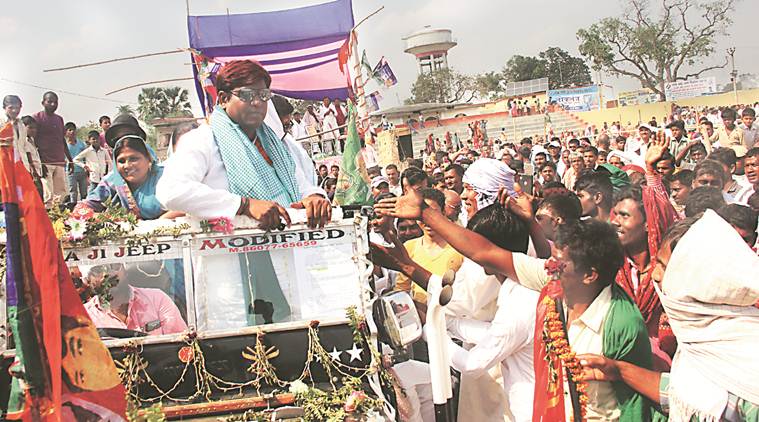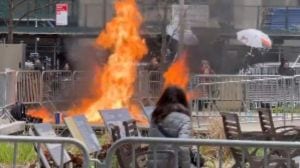- India
- International
PM Modi looms over new Bihar faultlines as an old one travels from Bollywood to Darbhanga
The “Son of Mallah”, who claims to speak for the larger community of fishermen, represents 'social justice' as spectacle, with its terribly shortened journeys: In a little over four years, Mukesh Sahani has travelled to electoral politics from a Bollywood film set.
 Vikasshil Insan Party’s Mukesh Sahani, the ‘son of Mallah’
Vikasshil Insan Party’s Mukesh Sahani, the ‘son of Mallah’
COME TO Darbhanga to get a glimpse of the new contest in Bihar. This district is home to its newest player, a caste leader who calls himself “Son of Mallah” (not translated in Hindi even when written in Devanagari) and is making his election debut at the head of a six-month-old party in the Bihar cauldron.
But first, the cauldron: In the 2014 Lok Sabha election, the Modi “wave” swept across caste and class cleavages, the overriding need and demand for “parivartan” propelling the chief minister of Gujarat into the national imagination. It relegated Bihar’s own leaders, Nitish Kumar, who had walked out of the NDA, expressing distaste for Narendra Modi’s leadership, and Lalu Yadav, to the sidelines. In sum, in that election, “Hindutva plus” was seen to lay low the forces of “social justice” in a state where caste is still etched deep.
Click here for more election news
In the 2015 Assembly election, Nitish and Lalu buried their fierce political rivalry and came together with the Congress in a “Mahagathbandhan” or grand alliance which stitched together a formidable arithmetic against Modi — and succeeded spectacularly. The alliance won Bihar, interrupting the Modi-BJP’s winning streak.
In 2019, the Modi arsenal has lost its promise of change but it has added more layers to compensate for it. It also includes Nitish Kumar, who has switched camps again, going back to long-time partner BJP, despite having opposed Modi in 2013 and in the elections in 2014 and 2015.
Now Nitish takes a visibly pale second place in a Modi appeal made up primarily of three things: A rampaging Hindutva; an array of Central schemes; and, over and above all, a muscular nationalism that projects a picture of a nation under siege from Pakistan and the internal Enemy, and promises that Modi will save it.

On the other side, this time, is a “Mahagathbandhan” but similar to 2015 only in name. It’s an alliance held up by the RJD forced to rely on Lalu nostalgia — this is the first election the master campaigner is confined to jail. It includes the Congress, which was, and is, only a third wheel in Bihar. And three small caste-based outfits, Jitan Ram Manjhi’s HAM, Upendra Kushwaha’s RLSP, and the new Vikasshil Insan Party (VIP) — all three have been previously associated with the NDA. The VIP, barely existing on the ground, is led by “Son of Mallah” Mukesh Sahani.
Read | Shatrughan Sinha: ‘I paid the price of sticking to truth and principles’
From ‘Devdas’ to ‘Son of Mallah’
The VIP is the embattled Mahagathbandhan’s attempt at co-option and expansion in a state where the politics of “social justice” continues to throw up newer demands of empowerment.
Yet, the “Son of Mallah” and his new party may also be the Mahagathbandhan’s confession: The Modi combine can only be stopped, it says, not by a new idea, but by old social engineering, riding the flimsiest of vehicles.
The “Son of Mallah”, who claims to speak for the larger community of fishermen, which includes several subcastes and titles including the Sahanis, represents “social justice” as spectacle, with its terribly shortened journeys: In a little over four years, Mukesh Sahani has travelled to electoral politics from a Bollywood film set.
Speaking to The Indian Express, Sahani, who is himself the Mahagathbandhan candidate from Khagaria, sums up his short story: In 1999, he ran away as a boy of 18 from his village to Mumbai, started work on the set of the Sanjay Leela Bhansali’s opus, ‘Devdas’, in 2001, and quickly went on to become contractor and supplier for it.
Politics began after he came back to his village in 2014 for Chhat pooja, at a time when Raj Thackeray’s aggressive anti-migrant rhetoric was rising in Mumbai. He organised a caste sammelan in Darbhanga, one political thing led to another, and in the 2014 Lok Sabha election he campaigned for the NDA. In 2018, after a Rath Yatra, rallies and road shows, he floated his own party in November. A month later, he joined the Mahagathbandhan, with the promise of seats in the high-stakes election in 2019.
The VIP has no office, no visible feet on the ground, even in Sahani’s home district of Darbhanga.
At the Nishad Dharamshala in Darbhanga town, a group of Mallahs say they have participated in public programmes organised by the “Son of Mallah” but the VIP is only “baat cheet”, “hawa hawai”, talk and hot air. “Modi has done good work for us,” says Manma Devi, and counts out the schemes: zero balance accounts, Ujjwala gas, toilet, road. “Aur Pakistan wallon ko uda diya (and he has destroyed Pakistan)”, chimes in Munni Devi. Manma Devi agrees: “Munh tod jawab diya (he hit them hard)”.
In Narayanpur village, about 20 km from Darbhanga town, a group of Sahani men acknowledges that Nitish Kumar brought development to their doorstep, but he is now a conduit, they say, through whom Modi sends them more public goods. Nitish is good, “par woh bhatak jaate hain (he strays)”.
In this election, says Suresh Kumar Sahani, the choice is this: “Baap ko bachayein ya bhai ko (shall I support my father or my brother)” — with “Son of Mallah” being the brand new brother figure who evokes caste solidarity, and Modi cast in the role of larger-than-life father.
Also read | Ravi Shankar Prasad: ‘This is an election between hope and opportunism’
Corruption, alcohol ‘home delivery’
On the road to Darbhanga and in the district, people in villages also talk of the incompleteness and corruption in the schemes pushed by the state and the Centre. Many say there is “home delivery” of alcohol in the time of prohibition and that it has only made alcohol more expensive for the poor. They speak of newly opened bank accounts lying empty, and bribes demanded by lower bureaucracy for everything including payments for NREGA.
Toilets have been built but in many places water has to be carried in buckets from the privately installed handpump because public supply is erratic or non-existent. Many who got the subsidised Ujjwala gas connection speak of not being able to afford a refill.
Schools have newer buildings but there is widespread despair over the sinking quality of teachers and education. The setback because of demonetisation and the continuing lack of jobs, which affects the young across castes, is especially hard to bear among the Scheduled Castes.
The BJP hopes to vault over these delivery incapacities and inefficiencies, and persistent joblessness, with the oversized projection of Modi, particularly after Pulwama and Balakot. “Majboor nahin, majboot sarkar (strong, not weak, government)”, promises the towering Modi billboard, on which Nitish finds no place even though he has wrested 17 seats in the alliance with the BJP.
That message is reaching, through TV and mobile phones and the RSS network, those who live in separated and segregated caste clusters in the village, and also, far more easily, the more mixed groups of young first-time voters in the town.
In Hari Ram Computer Learning Centre, one among the many coaching centres that crowd both sides of the narrow lane in Professor Colony in Darbhanga town, Mukesh Kumar Singh, 25, a Rajput, says: “Modi has carried out a surgical strike twice, but Congress governments couldn’t do it. Now, India retaliates.” “How will jobs come, if the country is not strong,” says Manjay Kumar, a first-time voter and a Yadav. “If Congress was in government, Abhinandan (Varthaman) would not have come back,” says Roshan Kumar, also an OBC. In “Super 20 Competition Classes”, next door, Abhilasha Kumari, Brahmin, 22, speaks admiringly of India’s “nuclear” capabilities and the surgical strike under Modi.
If on the one hand, the Modi message is up against ground level hardships of people across castes, it must also contend with, not so much Lalu’s social engineering, but his own achievements in giving the disprivileged “a voice”, which still resonate, not just among the Yadavs, but also among the Scheduled Castes.
‘Demonetisation broke our backs’
Inside an SC home in village Narayanpur, Usha Kumari, looks out of the window, speaks hesitantly, her tone low: “You see that field over there? Laluji had come. We got nothing, only demonetisation, which broke our backs. The attack inside Pakistan is a sorrowful event, dukh ki baat hai. No one, not Hindu nor Muslim, wins from death.”
Vibha Kumari, of the same family, says: “We get degrees, but there are no vacancies. I have done a BA and so has my husband but we are both jobless. The attack inside Pakistan is nothing to be celebrated. If we kill 10, they will kill 25. Where will it stop?”
And the Modi message stops outside the Muslim mohalla. In village Godhia Chaman in Vaishali district, Mohammad Afzal Husain says: “Modi did well to attack Pakistan. But India’s Muslim has nothing to do with Pakistan. Why does Modi ji not speak when we are targeted, jab hum logon pe zulm hota hai?”
Apr 19: Latest News
- 01
- 02
- 03
- 04
- 05






































